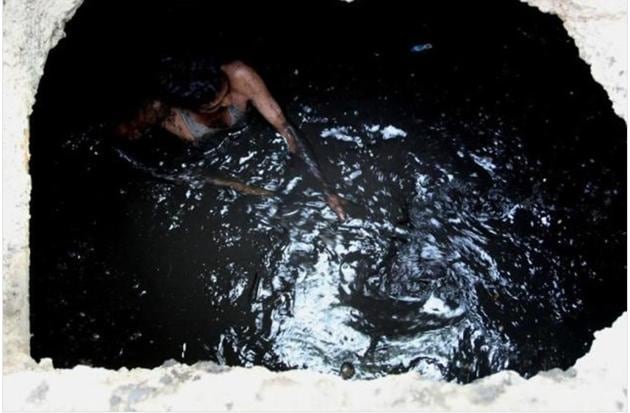Why sewage workers continue to die: No prosecution of accused
Municipal agencies have to provide equipment such as pumps at dangerous sites like clogged sewers. But contractors do not want to spend on the safety equipment
On Friday, three people died while cleaning the septic tank of a residential building in Nalla Sopara, a Mumbai suburb. The circumstances in which the workers died are harrowingly familiar: they had no safety equipment, and they suffocated to death after inhaling methane trapped in the drain.

In October, five people died after inhaling toxic gases in a well contaminated with industrial and domestic sewage in Kalyan, another suburb. In the same month, three workers died in Dombivli, Thane. In January 2018, four men choked to death after they entered a sewage duct in Powai, Mumbai, without any safety equipment. In September 2018, five men were killed in Delhi’s Moti Nagar, while cleaning a sewage treatment plant in a residential complex.
People die even though India has special laws mandating safe working conditions for sanitation workers. The Prohibition of Employment as Manual Scavengers and their Rehabilitation Act 2013 prohibits manual cleaning of toilet wastes, sewers, and septic tanks without safety gear and mechanised equipment. The law protects both municipal employees and casual workers employed by contractors hired by government agencies. Municipal agencies have to provide equipment such as pumps at dangerous sites like clogged sewers. But contractors do not want to spend on the safety equipment. In Mumbai, it is common to see workers entering storm water drains – meant only to carry runoff from rains but used as sewage drains - without any protection, dredging septic sludge with shovels and handheld pans.
The Safai Karamchari Andolan, a group campaigning to make sewage cleaning jobs safer, estimates that about 1,850 people have died in the last decade while cleaning sewers. The National Commission for Safai Karamacharis estimates that one person dies every five days in the country while cleaning sewers or septic tanks. But this number could be an underestimate. Dilip Hathibed, member of the Commission, said that 14 people have died in Delhi during 2017-18. Rashtriya Garima Abhiyan, a group campaigning for the eradication of manual scavenging, estimates that there were 302 deaths between 1992 and 2018, of which 29 were in Maharashtra.
India is probably the only country to have special laws for the safety of sewage workers. “That is because no country has practices (a caste-based occupation where some groups have traditionally done the job) like this,” said Bezwada Wilson of Safai Karamchari Andolan. “The 2013 law is very clear: you cannot allow workers to enter unsafe sewage systems without any safety equipment, but the government has not been taking any preventive measures.”
Hathibed, whose jurisdiction includes Maharashtra, said that laws, government guidelines and court orders cover both, workers employed by government agencies such as municipal corporations and private labourers hired by contractors. “Most victims are workers hired by contractors to clean septic tanks in apartments. These workers are poor and are ready to work in unsafe conditions; they get no safety equipment and are ignorant about laws that say that they should not be made to work in such conditions,” said Hathibed.
Wilson says that in some cases, private contractors are arrested but cases rarely reach the prosecution stage. The study by Rashtriya Garima Abhiyan estimated that a police complaint is registered only in one out of three cases, compensation handed out only in three out of ten cases. The study said that no cases were brought to trial. “Some people are arrested here and there but prosecution never happens; that is a major problem,” said Wilson.
Another reason why the issue has not received the attention it deserves is that almost all the victims are from marginalised and unorganised groups. Rashtriya Garima Abhiyan’s study said that 94% of those who died were from groups Scheduled Castes, 4% were from Other Backwards Classes and the rest from Scheduled Tribes.
Activists helping the workers said that another problem in prosecuting offenders is the limited scope of the law which covers only work related to manual cleaning of human waste.
Stay updated with all the Breaking News and Latest News from Mumbai. Click here for comprehensive coverage of top Cities including Bengaluru, Delhi, Hyderabad, and more across India along with Stay informed on the latest happenings in World News.
Stay updated with all the Breaking News and Latest News from Mumbai. Click here for comprehensive coverage of top Cities including Bengaluru, Delhi, Hyderabad, and more across India along with Stay informed on the latest happenings in World News.






